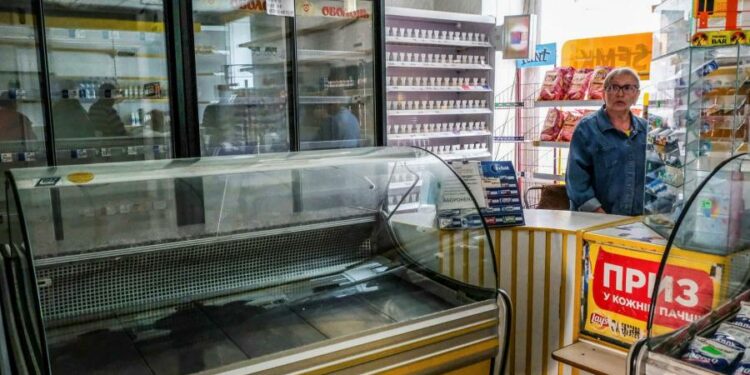Ukraine’s central bank has raised its benchmark lending rate from 10 per cent to 25 per cent, its first increase since Russia launched its full-scale invasion of the country in late February.
The National Bank of Ukraine described Thursday’s move as a “resolute step” to tackle inflation, which shot up to 17 per cent in May and is on course to hit more than double last year’s average of 10 per cent.
It said the rise would protect household income and savings in the hryvnia, Ukraine’s currency, and stop Ukraine burning through its foreign reserves need to protect its exchange rate.
A smaller rise, the NBU said, “would have had no significant influence on the financial and economic system” during wartime because of the likely limited effect on asset prices.
The central bank said it “expects that the government and the banks will respond adequately to the hike in the key policy rate by raising interest rates on domestic government debt securities and deposits”.
That, it added, “will make hryvnia assets, including domestic government debt securities, more attractive, preventing household income and savings from being eroded by inflation”.
Lower rates would have created expectations of future rate rises that would have damped demand for the local currency and not given hryvnia assets above inflation yields needed to revive investor interest, the central bank said.
It added that it would probably move to cut rates once inflation worries and pressures on the hryvnia subsided.
A sharp increase in government spending has pushed the budget deficit up 27 per cent month-on-month to $7.7bn in May, Kyiv-based investment bank Dragon Capital said in a Thursday note to investors.
Air strikes and artillery bombardment of cities have caused more than $100bn in infrastructure damage, according to the Kyiv School of Economics. The World Bank expects Ukraine’s economy to contract by as much as 45 per cent this year.
The country’s increasing reliance on imports has forced the central bank to spend more of its foreign reserves to maintain the hryvnia’s exchange rate with the dollar, rising from a $2bn monthly average in March and April to $3.4bn in April.
Kyrylo Shevchenko, the NBU’s governor, said support from Ukraine’s foreign backers was sufficient to sustain its reserves but called on the IMF to strike a new deal with Kyiv.
“As always, macroeconomic stability and the robustness of state finances should be at the centre of the programme,” Shevchenko said, according to local media.
Timothy Ash, senior emerging market debt strategist at BlueBay Asset Management, said the rate rise was “the rational and right thing to do”.
“With enough western financial support, Ukraine can outlast Russia,” he added. But he warned that if western backers did not change policy by continuing to finance Kyiv mostly through debt, it would reach “unsustainable levels” and trigger restructuring which would “set Ukraine’s postwar development back years”.
The central bank had shied away from raising rates in the first three months of the war and instead focused on ensuring Ukraine’s banking and payments systems continued to function.
It said the invasion had created “strong psychological pressure” that meant an increase would not stabilise inflation expectations or discourage Ukrainians from buying foreign currency.
By June, however, it said “risks to macrofinancial stability have risen in the medium term” from low yields on hryvnia assets as Ukraine burnt through its reserves.
“The threat has grown that the economy dollarisation might rise and the financial system might lose respective resources,” the NBU said.
“Depreciation expectations of households and businesses are not stable and are susceptible to war developments, in particular to changes on the frontline and other situational factors.”











